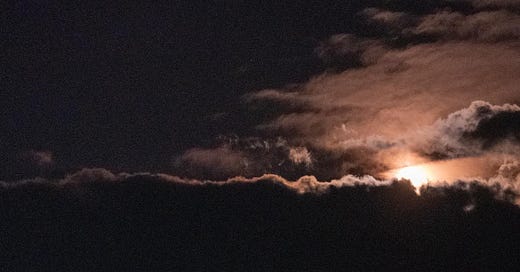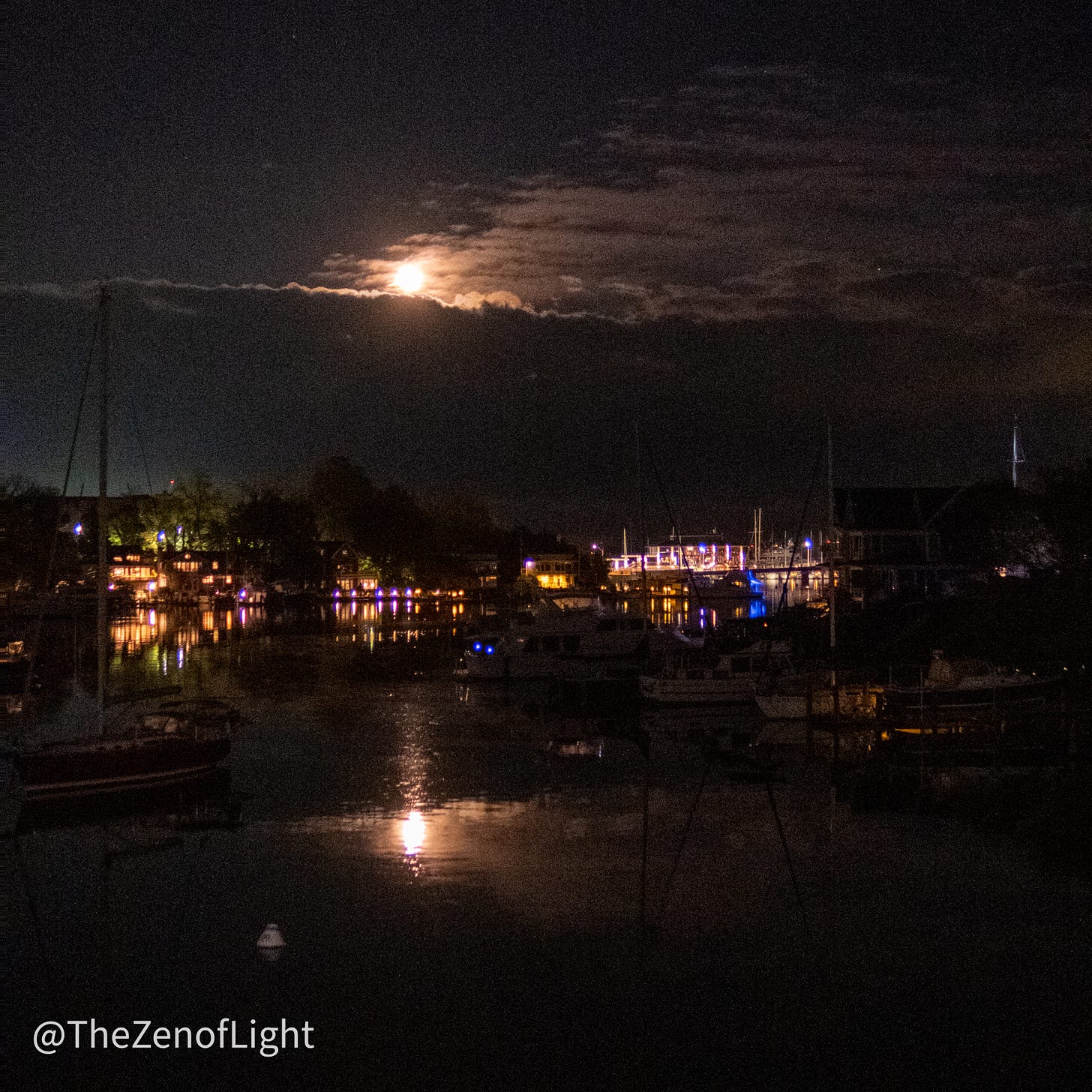Few things bore me like predictability so we start with a photograph from last night rather than at sunrise. We had no trick-or-treaters but we had this treat over the Creek about 8.45 pm. I hope you enjoy it as we did.
I don’t have the option to speak about China as often as I used to but I still begin any set of remarks with a reminder that isn’t a throw away line: when Xi Jinping’s feet hit the ground every morning, I strongly expect the top fifteen things on his mind are domestic rather than about the U.S. Navy in the Pacific. Of course the CCP worries about foreign policy but they fear domestic concerns far more because that’s what overthrows most dynasties.
Today’s news reminds how relevant this remains as we begin November. Over the weekend, reports indicated that 67 year-old Li Keqiang died of a heart attack. He served as the Premier of China until merely eight months ago as Xi’s deputy until Li left his position at the end of his second term (unlike Xi who broke the norm by sticking around for at least a third term).
Li earned a doctorate in economics and was perhaps the last gasp for technocrats in China. This nomenclature referred to the generation rising out of the ashes of the Great Proletariat Cultural Revolution (1966-~1976) to apply his tailored education to solving the problems confronting the Communist society upon Mao’s death in 1976. Other stories mentioned him as a ‘reformer’ but I urge caution as he was definitely a loyal CCP member or he would never have reached the Standing Committee of the Politburo where he won the cherished slot as number 2 guy in the apparatus. Reform is a relative concept in this case.
Li also was supposedly a protege of or allied with Xi’s immediate predecessor as General Secretary of the Party (the true powerful position rather than head of state), Hu Jintao. Hu’s halting, uncomfortable public exit for unexplained reasons at the major Party conference last October was jarring. Video of the scene reminds us that Li did not direct Hu back to his seat in the cavernous Great Hall of the People. Instead, the former General Secretary had escorts moving across the stage. Li Keqiang’s purported affiliations with the former General Secretary provided no long-term relief for either man, though their departures from the Party elite were roughly six months apart.
We have a tendency to apply our explanations to China’s activities without remembering that the Party, byzantine and opaque in decision-making, chooses people for leadership positions with an eye towards where the CCP is maneuvering. The CCP as a Marxist-Leninist group is hierarchical but a collective group rather than a movement under the iron will to a single person much like today’s GOP. Reform definited as a Party less centrally controlling the society certainly died as Xi consolidated power, if not at the end of Jiang Zemin’s rule in 2002. If Li Keqiang indeed had internal support for reforming, then Li’s coalition within the CCP proved unable to sustain that priority. The Chinese system move deliberately along the path towards Xi’s ever more centralised Party control with a seemingly hard view of the Party dominance in citizens’ lives across China.
The aspect most telling today, however, is how the Party is communicating about the death of the erstwhile second in charge of the most significant body within the country. If Dick Cheney had died in office under President George W. Bush, it would have been tremendous news (even if we take into consideration how energetic news media are today about having something new to say). Consider the attention in July 2022 when former Japanese Premier Shinzo Abe died by assassination.
The CCP wants China done with Li Keqiang so we move on to other things like anti-Semitism or preparing for the WTO meeting in San Francisco. They do not want those who doubt the path the CCP has them following to remind anyone that options exist.
It’s insufficient to argue that China is a controlled state media while the U.S. or Japan have free competitive media; China manages to highlight whatever they want when it suits their purposes because the state plays such a substantial role in daily life. The initial death report was so restrained in state media that a colleague wondered out loud if Li might have committed suicide rather than suffered a heart attack. It’s possible but I think another answer is plausible.
Li was reported to advocate reform of China economy, code for allowing the market forces some increased role. He was far from alone on that position as other PRC economists, along with those from abroad, argue that the state role hinders an openness Beijing needs implement to adopt an economic model as the world’s second largest economy as population decline accelerates. Xi appears to see ‘reform’ as synonymous with the opposite steps he implements. With hundreds of thousands of Chinese students educated in freer market economic programs around the world, this divergent approach is known to many so Xi also worries about citizens chaffing under his increased centralisation. Is that concentration of power for him or for the better of the nation, in fact?
This echoes hauntingly of 1989 to Xi, I suspect. The 4 June massacre on Tian’anmen Square did not originate with a papier mache figure vaguely looking like the Statue of Liberty. The students congregated because they were dissatisfied with how the Party memorialised the death of another purported liberaliser, Hu Yaobang. The current Party leadership wants no space in China’s life to mobilise protestors challenging Xi Jinping’s decisions. Markedly greater attention, much less examination of Li’s purported suggestions for reform, risk this would undermine social stability. This is especially true almost exactly year after protests drew international attention in pressing to end Xi’s policy on COVID lockdowns. Some protestors actually uttered the unthinkable—asking that the Party’s rule end as well.
The Party’s approach to governing and social stability are rock solid conservative to prevent luan. Anything that could resurrect past CCP trauma appears hauntingly possible with this death.
The second concern is more indirect: Chinese billionaires wanting to retain their money. Karl Marx and Mao Zedong, the ‘alleged leaders for the people’, roll over every time someone observes this but the Middle Kingdom, according to Amy Hawkins of The Guardian, has at least 20 % of the world’s billionaires. Hawkins quotes an economist noting ‘‘a high level of uncertainty about future economic policies and business opportunities in China..encourages people to take their money out of the country’ and Xi does not trust these folks.
$600 billion dollars from ultra-wealthy Chinese accounts fled the country eight years ago after Xi devalued the renminbi. Xi and Party officials resist the pressure the rich opposing stronger Party control over the economy. Alibaba founder Jack Ma openly asked why the Party was pursuing greater control, then he disappeared from public view for many months following his temerity to challenge Xi orthodoxy.
This ‘wealthy elite’, often Party members educated abroad and accustomed to the unbridled optimism developed after Modernisation began in the late 1970s. no longer believe contemporary China favours their interests or protects them. Hawkins cites an immigration consultant predicting 13.5 thousand ‘high-net-worth’ individuals seeking to depart the country in 2023, roughly a third more people than twelve months ago. Those seeking to depart intend to take not merely family members but their entire financial enterprises to begin again overseas in more favourable conditions.
Xi Jinping may have won his 'third term’ (critics abroad tend to assume his life-remaining term but that is speculation) a year ago but it’s been a hard year for his leadership. The public protests in November 2022 over the seemingly unending and draconian COVID lockdown contributed to Xi abandoning the policy but we will likely never know quite how much. At least two major reversals on People’s Liberation Army senior appointments and that of the Foreign Minister during this calendar year raise questions about his judgement on the character of those he appoints to high offices while also raising the slight possibility that his support within the CCP is shakier than thought twelve months ago.
Repeated questions about how China’s economy can return to unparalleled growth remain unanswered except to shift repeatedly to prevent pain for workers, the people still unable to emigrate. Those workers could manifest wide scale dissatisfaction if their lives deteriorated, although the Party tries to thwart the networking across society that would require. Foreign investors are heeding calls from their governments to think long and hard before blithely accepting opportunities to enter the unfriendly but large Chinese economic maze. Xi urges his citizens to eschew western ideas and cultural invasion of the Middle Kingdom while zigzagging on policy hindrances which dissuaded foreign investment over the past several years. When push comes to shove, Xi adamantly sticks to policy statements about China’s future on a stable track while providing a better living for its citizens than the volatile ‘democratic’ regimes such as the United States. But his arguments sound increasingly hollow, hardly inspiring of late.
In sum, the ‘great CCP’ regime appears somewhat back on its heels. Fearful of its own history and population, the Party recognises its durability rests not on legitimacy but on providing an improved standard of living for the people, though that task increasingly difficult—as do most middle income regimes. The irony of Li Keqiang’s death not easing pressure on Xi to move towards reform cannot be ignored any more than the reality that sending citizens abroad undoubtedly exposed them to the huge trade offs they are asked to swallow for the future. Thirteen thousand of them hope to march with their feet to leave Xi and his Thought behind but one has to wonder what would trigger Beijing acting aggressively to prevent that?
Thank you for reading Actions Create Consequences, especially those generous subscribers. I welcome comments. Please circulate this column if you think someone would appreciate it.
A second shot closed out Halloween.
Be well and be safe. FIN
Amy Hawkins, ‘‘China’s billionaires looking to move their cash, and themselves, out’, theguardian.com, 30 October 2023 retrieved at https://www.theguardian.com/world/2023/oct/31/chinas-billionaires-looking-to-move-their-cash-and-themselves-out






Completely understandable
Had dinner last night with retired Japanese Ground Self-Defense Force lieutenant colonel, close family friends since they were stationed in DC eleven years ago. As an MD, he was deeply involved in learning how USMC and USA do expeditionary medicine, field hospitals, etc. Just as they began developing amphibious capability, they saw the need to provide medical services in the field. He now works for international pharmaceutical firm and stays in tune with foreign affairs. He showed no interest in the middle East or Ukraine. Only wanted to know what I thought China might do next. Sign of the times, if you live in this neighborhood I guess.